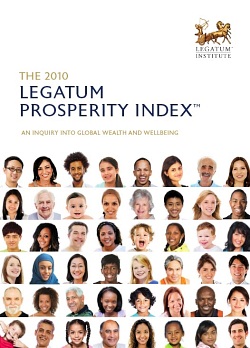Mexico scored relatively poorly in the 2010 Legatum Prosperity Index. It occupied rank 53 of the 110 countries for which sufficient data was available. The Prosperity Index compares data for dozens of criteria, grouped for convenience into seven main categories. These categories, with some examples of their respective criteria) are:
- Economy (GDP, employment indices, optimism about the economy, ability to afford food and shelter, inflation, savings rates, rate of non-performing bank loans)
- Entrepreneurship and Opportunity (royalty receipts from intellectual property, ICT exports, R&D expenditure, cell phone ownership, business start-up costs)
- Governance (political system, business regulations, effectiveness of government bureaucracy, anti-poverty policies, environmental policies, confidence in legal system, fairness of elections)
- Education (enrolment in primary, secondary and tertiary education, gender equality in education, class sizes, years of schooling)
- Health (rates of malnourishment, immunization, infant mortality, perception of personal health, life expectancy, healthcare budget)
- Safety and Security (refugees, internally displaced persons, incidence of state-sponsored violence, disputes over ownership or occupancy of land, control of religious or historical sites, proximity to environmental hazards, crime rates)
- Personal Freedom (freedom of speech and belief, civil liberties, racial tolerance)
- Social Capital (religion, perceived trustworthiness, voluntary work, charitable donations)
How does Mexico compare to other countries in the Americas?
The top ten countries in the Americas on the Prosperity Index, together with their world rank, are:
- Canada 7
- USA 10
- Chile 32
- Uruguay 28
- Costa Rica 33
- Panama 40
- Argentina 41
- Trinidad and Tobago 44
- Brazil 45
- Mexico 53
How does the Prosperity Index summarize Mexico’s position for the different groups of critera?
- Economy (rank 31) – Mexico has a large and relatively stable economy, but some citizens struggle to afford life’s necessities.
- Entrepreneurship and Opportunity (rank 59) – Bureaucracy and poor technological infrastructure limit entrepreneurial and innovative activity in Mexico.
- Governance (rank 66) – Mexico’s government may be unpopular, but it is largely democratic and well regulated.
- Education (rank 69) – Mexico successfully promotes basic education, but does not produce enough skilled workers.
- Heath (rank 54) – Mexicans receive good preventative healthcare and are broadly satisfied with their health.
- Safety and Security (rank 79) – Mexico suffers serious challenges from criminal violence and emigration.
- Personal Freedom (rank 72) – Mexicans are relatively dissatisfied with their own lives and relatively intolerant of immigrants.
- Social Capital (rank 39) – Mexican social networks are strengthened by volunteer work and religious attendance.
Various simple and compound development indices are discussed in chapters 29 and 30 of Geo-Mexico: the geography and dynamics of modern Mexico. Ask your local library to purchase a copy today!

Sorry, the comment form is closed at this time.